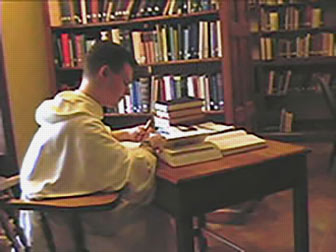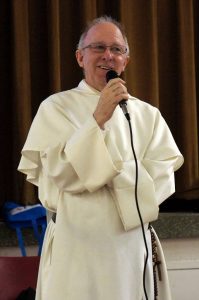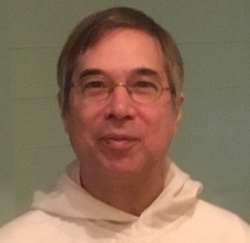Being called to Dominican life
- Steps in becoming a Dominican
- Spirituality
- The pillars of Dominican life
- Admission Conditions
- Vocation Director

First Step: Getting to know one another
 Today young people are in an authentic search for the Dominican vocation, in order to join some 6500 friars and 32 000 apostolic sisters and cloistered nuns working in 83 countries. The different steps that bring a friar to a definitive commitment in the Dominican Order (or Order Preachers) are simple; they are directed toward a fundamental objective: to permit the coherent and progressive integration of the principles that make up Dominican life.
Today young people are in an authentic search for the Dominican vocation, in order to join some 6500 friars and 32 000 apostolic sisters and cloistered nuns working in 83 countries. The different steps that bring a friar to a definitive commitment in the Dominican Order (or Order Preachers) are simple; they are directed toward a fundamental objective: to permit the coherent and progressive integration of the principles that make up Dominican life.
The first step, above all else, permits the candidate to better get to know the Order. This is normally done through regular meetings with one of the local vocations directors. The vocations director will enable further contact with other Dominican communities with varied lifestyles as well as help the candidate discern whether or not he is made for Dominican life. If there is a positive response at the end of this step then the candidate will be invited to proceed to the next step: postulancy.
Second Step: Postulancy
The candidate who aspires to become a Domincan is invited to live in a Priory (community of friars) for at least three months before the beginning of the novitiate. During the time of the postulancy the candidate can keep his job and/or continue to pursue studies. At the same time, this step permits a progressive integration into the life of a community: prayer, meals, community meetings, times for renewal and formation. The candidate is invited to undertake activities that engage him at both the social and pastoral levels.
During the postulancy a formation program is established by whoever is responsible for the postulancy. Monthly meetings of all the postulants are planned. These meetings develop fundamental themes such as the catechism, Dominican spirituality, particular areas of personal growth and affective maturity. At the end of the postulancy experience the community, or representatives of the community, is invited to offer an opinion on the admittance of the candidate to the novitiate.
Third Step: Novitiate
 The duration of the novitiate is 12 months. The novitiate begins every year on the 1st of August and lasts until the 8th of August of the following year. This time of retreat allows future friars (ordained or not) to know Dominican life more intimately than before. Through the daily shared experience with other novice brothers, those in charge of formation (Novice Master and the assistant) and the members of the welcoming community, the novice progressively discovers the major identity traits of the Dominican identity.
The duration of the novitiate is 12 months. The novitiate begins every year on the 1st of August and lasts until the 8th of August of the following year. This time of retreat allows future friars (ordained or not) to know Dominican life more intimately than before. Through the daily shared experience with other novice brothers, those in charge of formation (Novice Master and the assistant) and the members of the welcoming community, the novice progressively discovers the major identity traits of the Dominican identity.
This period of 12 months includes diverse activities: the study of the life of St. Dominic and other great Dominican figures; the study of the Constitutions and the history of the Order; an introduction to the Bible, to personal and community prayer and liturgy; an elaboration of apostolic activities; visits to different Dominican communities and meetings with brothers and sisters in various apostolates.
The end of the novitiate is marked with the “simple profession” (for a period of three years) on the occasion of the Feast of St. Dominic, August 8th.
Fourth Step: Academic Studies
 After the novitiate, the new friar integrates into a community of formation, usually the Couvent St-Jean-Baptiste d’Ottawa. Although integrated into the life of the community itself, the friars in formation form a more limited community called the “studendate” where one finds the space to consolidate the values acquired thus far. This new step corresponds to institutional studies pursued at the Dominican College of Philosophy and Theology in view of attaining bachelor and then graduate degrees in theology.
After the novitiate, the new friar integrates into a community of formation, usually the Couvent St-Jean-Baptiste d’Ottawa. Although integrated into the life of the community itself, the friars in formation form a more limited community called the “studendate” where one finds the space to consolidate the values acquired thus far. This new step corresponds to institutional studies pursued at the Dominican College of Philosophy and Theology in view of attaining bachelor and then graduate degrees in theology.
Fifth Step: Integration
This step usually marks an interruption. In keeping with certain objectives it is more profitable for future clerics to take this step at the end of a first degree in theology. This step consists of a pastoral placement that allows the friar to appropriate and apply theological learning to concrete needs and situations. This step also permits the friar in formation to reflect on his apostolic motivations and to clarify theological questions before undertaking the last step of studies.


A few years ago a group of brothers and sisters came to a definition of Dominican life that I like because it takes into account the rich diversity of those who make up the Order today, at the same time as she is faithful to Dominic’s initial project: a Dominican is a being polarized by the Word, a Word studied, celebrated, lived and announced to others.
The Dominican friar studies the Word
 St. Dominic did not wait for the twentieth century to invent the concept of lifelong education. Dominic, as attested to by the acts of his canonization, “often urged the brethren of this Order, by word and by letter, to study unceasingly the new and the old Testament. He always carried with him the Gospel of St. Matthew and the letters of St. Paul, and he studied them so much that he knew them almost by heart. The Dominican study does not look like the “skull stuffing” of students approaching the exams.
St. Dominic did not wait for the twentieth century to invent the concept of lifelong education. Dominic, as attested to by the acts of his canonization, “often urged the brethren of this Order, by word and by letter, to study unceasingly the new and the old Testament. He always carried with him the Gospel of St. Matthew and the letters of St. Paul, and he studied them so much that he knew them almost by heart. The Dominican study does not look like the “skull stuffing” of students approaching the exams.
Its primary purpose is not to advance science or to create the sweet pleasure of learning new. Even with rigorous scientific methods, the Dominican is looking for someone first. He approaches the sources of knowledge as the lover reads a letter to his betrothed, engaging his heart with as much ardor as he applies his intelligence. The search for the Dominican resembles the attitude of Mary who receives the interventions of God, recognizes the value and meditates in his heart, turning them, turning them constantly to the light in fullness. Study is a contemplative act.
The Dominican friar celebrates the Word
Liturgy matters to the Dominican as food is essential for the body. By its very nature, the Dominican can not do without celebrating the Divine Office with his brothers, without becoming anemic and suffer serious deficiencies. Is not it significant that Dominique in prayer was the favorite subject of artists and chroniclers? Almost nothing is said about the preaching of the Father of Preachers, while we dwell on his prayer for a long time. For Dominic, as for his disciples, prayer – especially the liturgy – is an act of preaching. Composed almost exclusively of biblical texts, the Office brings us to transmit to each other, each in our turn, verses of the Bible. We confide in each other, each in turn, each of us verses of the Bible.
We confide to one another the Word, at the same time as we return it to God. As a sign of charity in fullness, when the love of God and of neighbor are confused in the same activity! To play thus with the Word, it permeates the mind, the mentality, it transforms life. The liturgical act is a creative action of God to which we collaborate; with God we allow the Word to become flesh always, to become our own flesh to the point that it is no longer me who lives, but the Christ who lives in me (Galatians 2, 20).
The Dominican friar lives for the Word
What a temerity in this affirmation. I say it as an ideal that we seek and not as a classified case. Our community does not gather saints but sinners. It is because we are sinners that we join the Dominican family. At the time of making profession, do not we ask for the mercy of God and of our brothers?
Ever since its founding, every convent has been working for reconciliation, reconciliation of the person with himself, reconciliation with others and with God. We want to be a sign of the Kingdom that liberates, sign of the mercy of God. We reinvent, or rather God reinvents the Saving Word. Our fraternity seeks to become a living gospel and a church cell.
The Dominican friar proclaims the Word
 We do not live for ourselves. Our study aims to make us capable of being useful to others, as the Basic Constitution says. Our prayer makes us contemplate what we will deliver to others. Our communion makes us live what we want to build with the Church and the world. The salvation of the world is our only raison d’être. “What will become of sinners? “Cried St. Dominic.
We do not live for ourselves. Our study aims to make us capable of being useful to others, as the Basic Constitution says. Our prayer makes us contemplate what we will deliver to others. Our communion makes us live what we want to build with the Church and the world. The salvation of the world is our only raison d’être. “What will become of sinners? “Cried St. Dominic.
Our whole life is moving towards others to bring them the Saving Word. Cumans are numerous in the world to live far from the Source, unaware of their thirst. Others realize that their lives need a living water and claim it. It is to them all that the Dominican wants to go. And to the lines of fire, the most intense of the fight!
This is a rough portrait of the Dominican, of Dominican life. The old people would have liked to read something newer, more fresh, more searched. I hope that the one who is at his first contact will find the taste to go further.
Br. Denis Gagnon, o.p.

Prayer
We Dominicans center our lives on Jesus Christ, the true light, and are moved by the Holy Spiriti who radiates God’s healing presence in the world today. We celebrate the Word in daily common prayer, meditation, study, and in the proclamation that is preaching. Our lives are nourished by God’s Word as spoken in sacred scripture, celebrated in the Eucharist, and encountered in everday life.

Community Life
For Dominicans, the communal dimension of our religious life challenges to us to be of “one mind and one heart in God.” Profession into the Order of Preachers includes the promise to hold all things in common. We live together and pray together and share a common vision in the ministry of Preaching. It was St. Dominic’s desire to imitate the apostolic poverty of Jesus and the early church, so “we call nothing our own.” As Dominicans, we share our blessings with the rest of the world.

Study
St. Dominic made stuy an essential part of the “Sacred Preaching.” This was no small innovation in the thirteenth century when most of the clergy were uneducated. St. Dominic sent the friars to the universities to study, to preach, and to establish places of learning. The dedication to study and teaching continues today. The Dominican emphasis on study opens our hearts and minds more fully to the human condition today, continues to build on a rich history and tradition and has its ultimate effect on our preaching and teaching.

Ministry
As Dominican Friars, we continue the work of St. Dominic today in an active and contemplative life. Our mission includes preaching, teaching, and works of social justice in a variety of settings: campus ministry, parishes, colleges, universites, and retreats. We are inolved in full-time itinerant preaching, health care as chaplains and ethicists, and in the arts. In our outreach to the poor we work for truth, justice, and peace in today’s society though our parishes, campus ministries, and involvement in the local and universal church. (Source : Domcentral Website)


 Still today young people are choosing the Dominican vocation, in order to join the some 6500 brothers and 40 000 sisters and nuns of the Dominican Family who are present in over 83 countries. The various stages which lead the Brothers to a final commitment in the Dominican Order (or the Order of Preachers) are quite simple and are centered on a fundamental objective: to allow coherent and progressive integration of the principal components of Dominican life. Here is what is required from an applicant who wishes to join our Order :
Still today young people are choosing the Dominican vocation, in order to join the some 6500 brothers and 40 000 sisters and nuns of the Dominican Family who are present in over 83 countries. The various stages which lead the Brothers to a final commitment in the Dominican Order (or the Order of Preachers) are quite simple and are centered on a fundamental objective: to allow coherent and progressive integration of the principal components of Dominican life. Here is what is required from an applicant who wishes to join our Order :
- To have the experience of being a disciple of Jesus Christ, and to be committed to His Gospel. In the case of candidates who are recent converts, who have been recently baptised, or who have recently returned to the Faith, they must wait three years before being admitted to the Order (novitiate).
- To be significantly involved in the Church.
- To be capable of obedience and solidarity when a mission in the service of the Order requires it.
- To manifest the aptitudes needed to live in community.
- To be between the ages of 22 and 40 years old. Candidates above 40 years old must show an exceptional faith journey and faith involvement.
- To have completed studies at the high school level.
- Not to have any significant debts, nor to be in the process of paying off debts before entering the novitiate.
- To have lived independently and responsibly before entering the Order.
- To show evidence of affective maturity to live a life of chastity in consecrated celibacy.
- To be in good physical and psychological health.
- To be a Canadian citizen, or already admitted in Canada as a Permanent Resident

Contacting our National Vocation Director
 Fr. Raymond Latour, OP
Fr. Raymond Latour, OP
372 Huron Street
Toronto ON, M5S 2G4
Courriel: assistant_provincial@dominicains.ca

